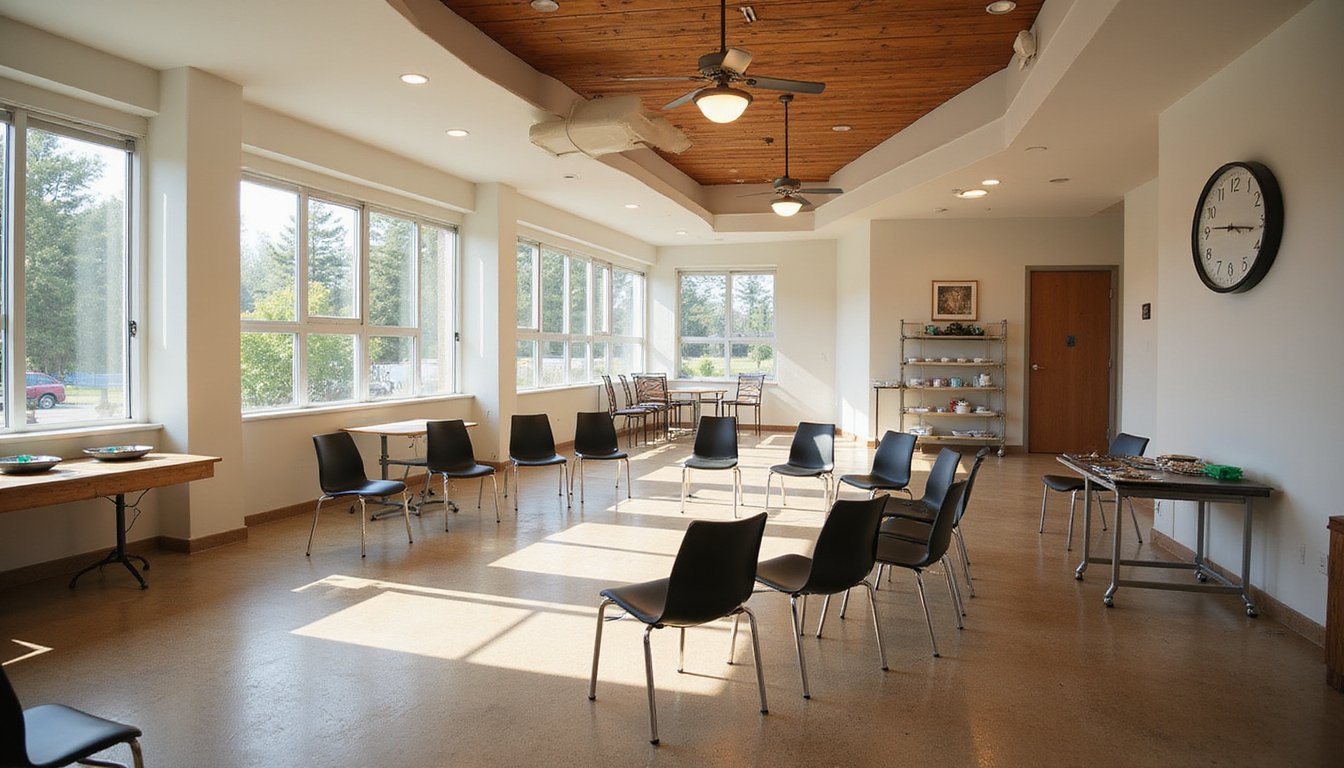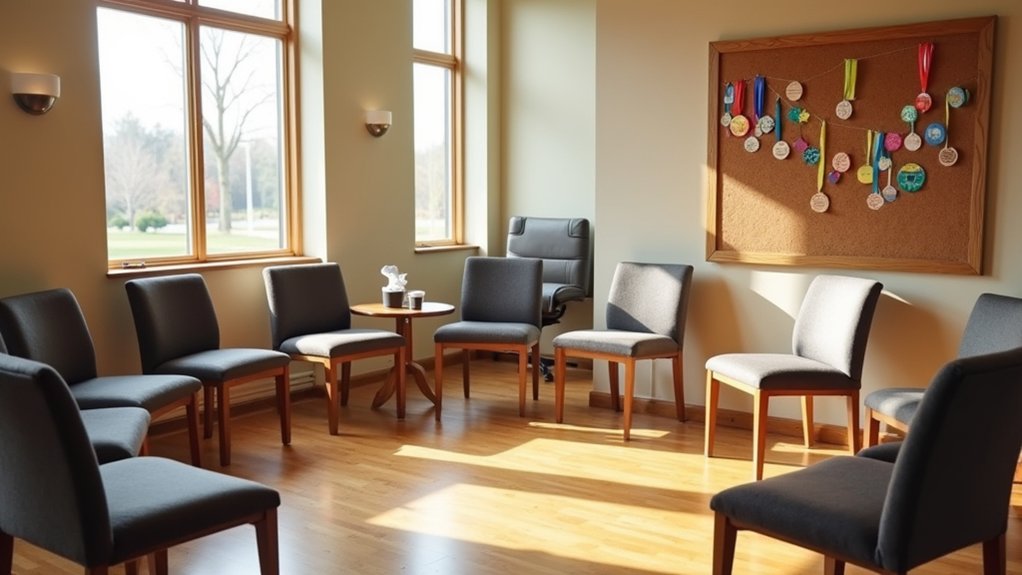During your initial week at an inpatient detox facility, you’ll undergo thorough medical screenings and begin a customized treatment plan. You can expect round-the-clock medical supervision as your body processes withdrawal symptoms, with medical staff monitoring your critical signs and providing medication support as needed. Your days will include both group and individual therapy sessions, meetings with your treatment team, and adapting to facility routines. Comprehending what lies ahead can help alleviate your movement into this crucial recovery stage.
Arrival and Initial Assessment Process

When you initially arrive at an inpatient detox facility, you’ll undergo an exhaustive intake process designed to assess your needs and establish an appropriate treatment plan. Staff will verify your insurance coverage, complete necessary paperwork, and explain the facility’s policies and procedures. During this time, you’ll review and sign consent forms acknowledging your rights and responsibilities. You’ll need to provide essential documentation including identification, insurance cards, and current medication lists. The facility’s security measures help protect patient confidentiality and prevent unauthorized access to treatment areas.
The assessment team will gather detailed information about your substance use history, previous treatment experiences, and current life circumstances. They’ll also evaluate your mental health status and immediate medical needs. This comprehensive evaluation allows medical staff to develop a personalized detox plan tailored to your specific situation. Referral coordination with your previous healthcare providers guarantees continuity of care. You’ll meet your primary treatment team and receive a facility tour, while family orientation sessions help involve your support system. Throughout this process, staff will emphasize confidentiality policies and address any concerns you have.
Medical Screening and Health Evaluation
After completing the initial intake process, you’ll begin a thorough medical screening and health evaluation to establish your physical and mental baseline. Medical staff will conduct detailed blood tests, toxicology screens, and a physical examination to assess your vital signs and general health status. Public intoxication was historically treated as a criminal offense before medical detox facilities became standard practice.
The evaluation includes a comprehensive review of your medical history, current medications, and any pre-existing conditions that might affect your treatment. Mental health professionals will screen you for psychiatric conditions and assess your cognitive function. This extensive evaluation enables the medical team to develop a personalized stabilization plan with appropriate medication protocols. During this phase, medical professionals carefully assess whether you have physical dependence on substances based on your usage patterns and symptoms.
Throughout this process, continuous risk monitoring guarantees your safety, while allowing for quick adjustment of care plan based on your symptoms and response to treatment. Based on ASAM criteria, medical staff will determine if you require medically monitored inpatient care for safe detoxification. The medical team will constantly document your progress to coordinate your care effectively.
Understanding Your Daily Schedule

Your daily schedule at the detox facility follows a carefully structured routine designed to support your recovery process. You’ll begin each day with morning wellness checks and breakfast, followed by a mix of individual counseling, group therapy sessions, and educational workshops throughout the day. This structured environment helps reduce stress and anxiety during the challenging detox period. If certain programs experience too much traffic, alternative activity times may be offered to ensure everyone receives proper care. Patients can access the local canteen facilities between scheduled activities to maintain proper nutrition throughout their stay. Your evenings will include leisure activities and support groups, with designated quiet hours to guarantee you get adequate rest for the next day’s therapeutic programming.
Structured Daily Activities
Entering an inpatient detox facility means adapting to a highly structured daily schedule designed to support your recovery expedition. You’ll participate in daily group therapy sessions that foster peer interaction and community connection, along with individual counseling to address your specific needs.
Your day will include essential medical and psychological assessments, regular meals, and a mix of psychoeducational classes focused on addiction understanding and relapse prevention. You’ll engage in wellness activities like meditation or exercise, and attend skill-building workshops that teach stress management and emotional regulation. Each day begins with morning mindfulness practices to center yourself and prepare for the day ahead. Trained professionals provide expert guidance throughout every step of your treatment journey. All of these activities are protected by security solutions to ensure patient privacy and safety.
Throughout the day, you’ll have opportunities for both structured therapeutic activities and scheduled downtime. Community meetings and peer support groups will help you build connections while maintaining accountability, creating a balanced environment that promotes healing and personal growth.
Morning to Evening Flow
While adjusting to detox treatment, you’ll follow a structured daily schedule that begins around 6:30 AM and ends with lights out at 10:00 PM. Your personalized care plan includes regular essential sign checks, medication distribution, and medical supervision throughout the day.
Mornings typically start with breakfast, followed by group therapy sessions or psychoeducation classes. You’ll participate in individual counseling, meet with medical staff for evaluations, and engage in therapeutic activities based on your treatment goals. The facility provides 24-hour care to ensure your safety and comfort during this critical phase. Scheduled downtime allows for rest and reflection between structured activities.
Afternoons and evenings include supplementary therapy sessions, meals, and opportunities for peer support. Staff members conduct regular wellness checks and remain available to address any medical concerns. This consistent routine helps create stability during your recovery process.
The Detoxification Experience
The initial week of detox represents a critical phase in recovery where your body begins eliminating toxins under careful medical supervision. During this period, you’ll experience physical withdrawal symptoms that vary in intensity based on your substance use history. Medical staff will continuously monitor your vital signs and adjust medications to manage discomfort and prevent complications. The process typically requires 24-hour medical care for close monitoring of withdrawal symptoms.
The psychological impact of detox can be significant, with anxiety, depression, and mood swings being common reactions. You’ll receive emotional support through counseling and brief therapeutic sessions as your condition allows. Ongoing medical monitoring guarantees your safety, particularly if severe withdrawal symptoms develop. The medical team will provide nutritional support and hydration while addressing sleep disturbances with appropriate interventions. As your physical symptoms stabilize, you’ll gradually begin participating in therapy sessions that prepare you for the next phase of recovery. The facility maintains a structured daily schedule to help you establish healthy routines and maximize your treatment time.
Your Treatment Team and Support Network

During your stay at an inpatient detox facility, you’ll be supported by a thorough team of healthcare professionals who work collaboratively to guarantee your safe recovery. Your care team includes physicians, nurses, therapists, and social workers who provide 24/7 medical oversight and compassionate staff support throughout your detoxification process.
Your treatment begins with exhaustive intake assessments, leading to personalized care planning that addresses your specific needs. Licensed medical providers will manage your medications and monitor withdrawal symptoms, while clinical therapists guide your recovery path. You’ll also have access to peer advocates who offer valuable insights from their own recovery experiences. Your team maintains constant communication through regular meetings and electronic documentation, ensuring that everyone stays informed about your progress and can adjust your treatment plan as needed.
Group and Individual Therapy Sessions
As you progress through detoxification, group and individual therapy sessions form essential pillars of your recovery journey. Through interdisciplinary collaboration, you’ll participate in small group sessions of 5-10 people, meeting multiple times weekly for 60-90 minutes. These structured environments facilitate personalized treatment plans while building connections with peers who understand your trek.
Educational segments help you understand substance effects and develop healthy decision-making skills. Skills training exercises strengthen your emotional regulation and problem-solving abilities. Group discussions provide opportunities to share experiences and receive supportive feedback. Individual therapy sessions address private concerns and complex issues requiring focused attention.
Your therapeutic experience combines evidence-based approaches with peer support, creating an extensive framework for sustainable recovery. Through this balanced approach, you’ll develop coping strategies and build a strong foundation for long-term sobriety.
Adjusting to Facility Life and Rules
Moving beyond therapy sessions, you’ll find yourself immersed in a highly structured environment designed to support your recovery expedition. Your day will follow a precise schedule, starting early with set times for meals, activities, and sleep. You’ll need to focus on adapting to restrictions, including limited access to electronic devices and outside communication.
The facility’s orientation will guide you through essential rules and expectations, from maintaining personal hygiene to participating in mandatory group activities. While managing peer dynamics in shared spaces might feel challenging initially, this community living approach fosters valuable support networks. You’ll learn to navigate roommate relationships, participate in group tasks, and respect social boundaries. Remember, these structured routines and rules, though potentially uncomfortable at first, serve to create a stable, therapeutic environment pivotal for your recovery pathway.
Building Your Recovery Foundation
Once you’ve settled into the facility’s routines, your initial week focuses on establishing core recovery foundations through a thorough stabilization process. Your treatment team will guide you through extensive medical and psychological assessments to create your personalized care plan. This foundation combines skill development and goal setting through various therapeutic approaches.
Key elements of your recovery foundation include:
- Individual and group therapy sessions to examine triggers and build coping strategies
- Structured daily activities incorporating mindfulness, fitness, and stress reduction techniques
- Educational workshops on addiction, relapse prevention, and emotional regulation
- Development of support networks through peer connections and therapeutic community engagement
You’ll engage in evidence-based treatments while learning essential self-care practices, setting the groundwork for your long-term recovery path.
Frequently Asked Questions
Can I Bring My Own Prescription Medications From Home?
You’ll need to declare all prescription medications during admission, but you won’t have private storage options. The facility’s medical staff will collect, verify, and securely store your medications in a controlled area. They’ll review each prescription to guarantee it’s safe and necessary for your treatment. Secure medication handling means nurses will administer approved medications according to schedule, while some prescriptions may be adjusted or substituted based on your detox needs.
Are There Designated Times for Making Phone Calls to Family?
Yes, you’ll have designated scheduled phone hours for family communication once you’ve completed the initial 3-5 day blackout period. During your primary week, you’ll be limited to one “safe call” upon arrival to notify family of your check-in. After that, the facility’s family communication protocols will allow for structured calling times, typically 10-15 minutes per session. Staff will help coordinate these calls to facilitate your recovery odyssey.
What Items of Clothing and Personal Care Products Are Allowed?
You’ll need to pack comfortable, casual clothing that’s easy to care for, including 5-7 days of t-shirts, jeans, and sweatpants. Don’t forget sleepwear, undergarments, and appropriate footwear like sneakers and shower shoes. For toiletry recommendations, you can bring new, unopened personal care items that are alcohol-free, including shampoo, deodorant, and basic makeup. Remember, clothing with drug/alcohol references or revealing items isn’t permitted, and it’s best to leave valuable jewelry at home.
Is Smoking or Nicotine Use Permitted at the Facility?
Smoking policies vary markedly between facilities. While most U.S. rehab centers ban indoor smoking areas, about 40% allow outdoor smoking in designated zones with supervised breaks. You’ll need to verify the specific rules with your chosen facility, as some enforce complete tobacco bans while others permit sealed cigarette packs. If you’re concerned about nicotine withdrawal, many centers offer nicotine replacement therapy and cessation support to help manage cravings during your treatment.
Can I Receive Visitors During the First Week of Treatment?
You won’t be able to receive visitors during your primary week of treatment. Most facilities enforce a strict “blackout period” as part of their facility visitation policies. This private visitation schedule helps you focus entirely on your detoxification process and introductory recovery without external distractions. While this separation may feel challenging, it’s an essential step that allows you to stabilize and adjust to treatment. Your treatment team will inform you when you’re ready for visitors.





